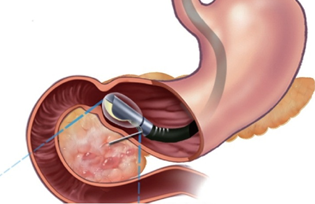Our specialists have practices dedicated to performing the following advanced endoscopic procedures:
Endoscopic Retrograde Cholangiopancreatography (ERCP) – ERCP is a technique that combines the use of endoscopy and fluoroscopy to diagnose and treat certain problems of the biliary or pancreatic ductal systems.
Endoscopic Dilation – Esophageal dilation is a procedure that allows dilatation or stretching, of a narrowed area of the esophagus.
Endoscopic Ultrasound (EUS) – Endoscopic ultrasound (EUS) is a technique using sound waves, known as ultrasound, during an endoscopic procedure to look at or through the wall of the gastrointestinal tract.
Percutaneous Endoscopic Gastrostomy (PEG) – Percutaneous endoscopic gastrostomy (PEG) is an endoscopic procedure in which a flexible tube is placed into a patient’s stomach and/or small intestine to allow nutrition, fluids, and/or medication to pass directly into the stomach or small intestine when a patient is not able to meet his or her nutritional needs orally due to a medical condition.

